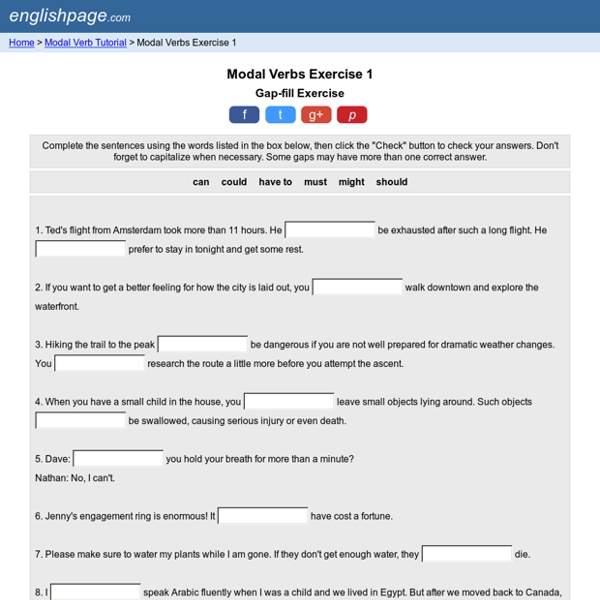Modal Verbs Exercise 1
1. Ted's flight from Amsterdam took more than 11 hours. He be exhausted after such a long flight. He prefer to stay in tonight and get some rest. 2. 3. 4. 5. 6. 7. 8. 9. 10. 11. 12. we pull over at the next rest stop? 13. 14. 15. 16. 17. 18. 19. you always say the first thing that pops into your head? 20.
Modal Verb Tutorial
Modals are special verbs which behave very irregularly in English. Englishpage.com has created one of the most in-depth modal tutorials in print or online. Study the modal explanations and complete the associated exercises and take another step toward English fluency. If you want to use the Modal Verb Tutorial as a reference only and do not want to complete the tutorial Click Here . The tutorial should be completed as follows: 1. 2. What are Modal Verbs? Modal verbs are special verbs which behave very differently from normal verbs. 1. Examples: He can speak Chinese. 2. He should not be late. 3. He will can go with us. Common Modal Verbs For the purposes of this tutorial, we have included some expressions which are not modal verbs including had better, have to, and have got to. Your personal online English school.
Modals of Polite Request
These four questions are made with modal verbs: Would you... ? Could you... ? Will you... ? Can you... ? Modal verbs are helping/auxiliary verbs that express ideas like ability, permission, and asking for assistance. For example: Could you help me for a minute, please? This shows that the speaker is asking for help politely. To ask questions in a very polite way, use: Would you/ Could you (please) + simple verb + ...? Would you please email that document to me? Could you explain that again, please? *ASAP = as soon as possible To ask questions in a polite but more casual way, say: Will you/ Can you (please) + simple verb + ...? Will you please answer the phone? Can you hold my books for me? We do not use the word “may” in a polite question when “you” is the subject. May you please close the door? Wrong! Could you please close the door? Right! The word “please” makes the request more polite and less direct. Possible positive answers to the questions above: Informally, we can say: Sure. No.
Related:
Related:



